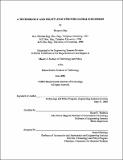A technology and policy analysis for global E-business
Author(s)
Zhu, Hongwei
DownloadFull printable version (6.973Mb)
Other Contributors
Massachusetts Institute of Technology. Technology and Policy Program.
Advisor
Stuart E. Madnick.
Terms of use
Metadata
Show full item recordAbstract
We introduce an e-business analytical framework that focuses on transaction flows, including information, physical goods, and services. Within this framework, global e-business involves transaction flows that cross both organizational and national boundaries. Many challenging technology and policy issues arise from this trans-boundary characteristic of global e-business. These issues are analyzed using web aggregation as an example global e-business application. We start the analysis by introducing web aggregation services and their enabling technologies. Our survey of current status of web aggregation indicates that most services are still operated regionally despite their global presence. Although benefits of web aggregation have been realized in regions with extensive use of information aggregation, little is done at the global level. Our case study on worldwide price distribution of a nearly homogeneous consumer electronics product indicates great potential for global aggregation to bring information and efficiency to the global market. In addition to lack of global integration, we identified other deficiencies of web aggregation. Technological challenges and possible solutions to overcoming these deficiencies are discussed. However, having technological capability for trans-boundary information flow does not solve all problems in global aggregation. National policies often prohibit such flow into nations that have different policies, especially in database and privacy protection areas. We analyze these policy issues and propose future research on international policy harmonization.
Description
Thesis (S.M.)--Massachusetts Institute of Technology, Engineering Systems Division, Technology and Policy Program, 2002. Includes bibliographical references (p. 49-51).
Date issued
2002Department
Massachusetts Institute of Technology. Engineering Systems Division; Technology and Policy ProgramPublisher
Massachusetts Institute of Technology
Keywords
Technology and Policy Program.